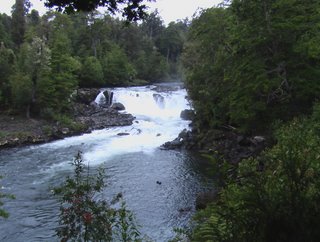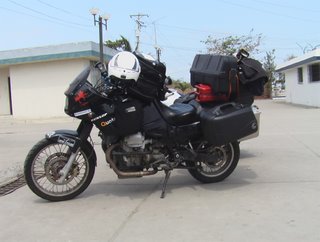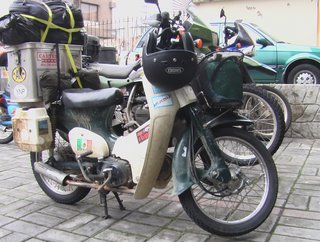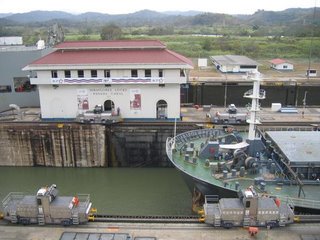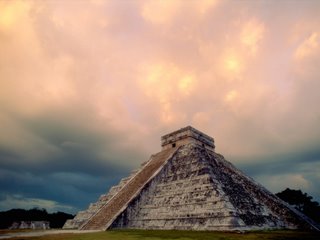
Nov 18, 2004
South from Veracruz, I spent nights in Villa Hermosa, Merida, Cancun, and now find myself in Chetumal, on the border with Belize and at the point where the adventure really starts, as far as I´m concerned, now that I've ridden this far down through Mexico. Riding in Mexico, while fun and exciting, is basically the same no matter where in the country you are. You go into a town, ride around the plaza, see the old church, the old government building, the building with the graphic display of British-French-Spanish-American (circle one) oppression, and the valiant armed struggle of the indigenous people to overthrow them, then roar on down the road to the next town to begin again.
Outside Merida I encountered Patrick, riding down the road at a very safe 55 MPH on his KLR650. I roared past, then stopped and talked to him. He told me that he´s going to Tierra Del Fuego. Patrick is from Montreal, and we talked about our trips so far and plans for down the road, then met again in Chitchen Itza. Patrick has this thing about seeing ruins and other tourist attractions.
Because of this, we ended up riding into Cancun at dark. As you reach the outskirts of the city the road is well lit. At every streetlamp bugs would splatter against my visor. I had to stop every quarter mile or so and clean them off. We decided to split the cost of a room in Cancun, and so got to be in the beach front area for $24 a night each.
We encountered an Old Bald Guy who told us in broken english that he would find us a hotel, asked us how much we wanted to pay, then ran off down one road, with us behind him. The first hotel was much more expensive than he told us it would be, and a dump, so he went running down the road toward another, at least a quarter mile away. While he was in the fourth one, I wandered into one beside it. It seemed clean, and was priced right (which for us was about $30 to stay in Cancun). The Old Bald Guy saw what I was doing and ran into the lobby, covered with sweat. The hotel didn't have whatever commission setup he was used to, so I gave him a couple dollars in pesos and he was off again, running through the night.
The first night we were there, Patrick spent an obsessively long time locking his bike with four different locks, and covered it, only to realize in the morning that he´d left the keys in the ignition. After losing my sleeping bag, tennis shoes and bike cover off the bike because of the inattention that comes from riding for days and days, I understand. Today he lost his key at
Tulum, and so spent this evening having two more made from the spare.
While in Cancun , we saw a BMW 650GS, and decided to talk to the owner to see if he too was bound for the tip of South America. It turned out that he was a Doctor, and a member of a Motorcycle group that was having a weekly meeting that night, and he invited us along
and to pictures of their recent ride. The meeting was at a very chic little hamburger place, and they were all extremely well groomed and articulate. We got to see the pictures of their ride,
and they were mostly taken of each other urinating, rolling around in white clay and roughhousing, and standing together in groups of two. They had a huge gift basket with wines and gourmet foods in it that they were parcelling out for $10 a ticket to raise money for
the club. We looked at each other with not just a little concern every time the Doctor invited us to stay at his house or ask us if we needed anything. Throughout the evening, he kept inching his chair closer to Patricks. So we started asking why they didn´t take any pictures of any hot women they saw on their ride. Though invited to this meeting, we ended up having to pay for our own meals and beers. And they didn´t ask us to join the club.
We decided to move to a nicer hotel on the beach, Most of the front desk people in Cancun tourist hotels speak very good English, and Patrick is far too honest to use deception to get a better deal, so Patrick pretended to be a television producer who only spoke French and I was the translator who explained the great project we were going to be filming, and that we would need about 20 hotel rooms when the cast and crew arrived. We ended up paying $50 a night for a nice room in a hotel on the beach with a pool where I could wash my riding jacket.
We went to the ruins in Tulum, on the coast. They are fairly small and I quickly grew bored while Patrick photographed all the blocks that make up a pyramid. There were a lot of iguanas, and a lot of people taking pictures of the iguanas, so I decided to see if I could catch one. Evidently there are places in Tulum where the iguanas know people are not supposed to walk or chase iguanas, something to do with "restoration in progress" or "archeological site," so I encountered a little hostility from the park rangers. Then the European tourists took off their tops to sunbathe and every Mexican worker in the place was so distracted with seeing to their comfort that I was free to chase iguanas or desecrate the ruins or disassemble them and take them with me.
While I am sitting here in this internet cafe in Chetumal, a guy two seats over is shouting into an internet phone in Chinese to his daughter back home.
Anybody know where to buy a sleeping bag around here?
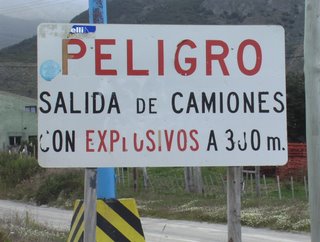
 Jan 5, 2005
Jan 5, 2005

